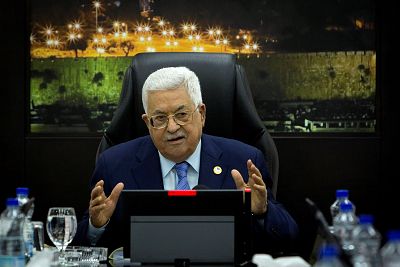Analysis: With Israeli politics in chaos and Netanyahu's government in jeopardy, it's unclear who he will be speaking to. And that's just one issue.
Jared Kushner is traveling in the Middle East on Wednesday drumming up support for President Donald Trump's long-awaited Israel-Palestinian peace plan.
But the Trump senior adviser's trip comes as the U.S prepares to unveil the economic portion of the "deal of the century" at a conference in Bahrain next month and could not come at a worst time.
World news
Not only does Kushner's team face near-unanimous Palestinian condemnation, he's looking at an uphill battle in winning widespread support across the Middle East.
And if that weren't enough, Kushner is flying straight into an unprecedented impasse in Israeli politics that will undoubtedly distract from sealing a deal.
'A completely insane position'
After a short stop in Jordan on Wednesday, Kushner is set to visit Israel on Thursday — but who will he speaking to? The parliament has been dissolved ahead of a midnight deadline to see if Prime Minister Benjamin Netanyahu can form a coalition government.
If Netanyahu fails, Israel will hold its second election of the year.
"In next few hours there might not be a government — we've gotten into a completely insane position," said Yossi Mekelberg, a professor of international relations at Regent's University in London. "This is not about the Palestinians anymore."
The dissolution of the Knesset could stop attempts by Netanyahu's Likud party to grant him immunity from prosecution.
Netanyahu hasn't yet been indicted but Israel's attorney general announced in February that he plans to do so in the wake of a two-year corruption investigation. Netanyahu denies wrongdoing.
The situation leaves Israeli politicians with little bandwidth to engage, as well as diminished authority.
On Monday, Trump tweeted his supportfor Netanyahu, who is perhaps the president's closest ally on the international stage.
No way, Palestinians say
Little is known about the deal that Kushner and envoy Jason Greenblatt have been working on for more than two years, but their public statements indicate the plan relies heavily on economic solutions, and not political ones.
The Palestinians have repeatedly spelled out they aren't even coming into the shop to see what Kushner is selling.
"The 'deal of the century' or the deal of shame will go to hell, with God's will, and the economic project they are working on next month will go to hell too," Palestinian President Mahmoud Abbas said earlier this week. "Whoever wants to solve the Palestinian issue must start with the political issue, not by selling the illusions of billions" of dollars.
The borders of a Palestinian state, the status of Jerusalem, the future of Palestinian refugees, and Israeli security demands are all longstanding priorities for Palestinian leaders.
While a two-state solution is broadly supported by the international community, recent comments by Secretary of State Mike Pompeo have thrown into question U.S. support for the concept.
To make matter worse, the Palestinians aren't even on speaking terms with Washington after their leadership cut ties in response to Trump's decision to move the U.S. Embassy to Jerusalem in 2017.
News
The Trump administration has also halted funding for UNRWA, the United Nations agency that has supported Palestinian refugees for seven decades, and other projects — deepening the hardship and desperation of millions of Palestinians in the blockaded Gaza Strip, and occupied east Jerusalem and the West Bank.
"We can build our own country," said Sam Bahour, a Palestinian-American business consultant based in Ramallah in the West Bank. "The only thing that is stopping us from doing that is getting the Israelis to remove this occupation so we have a chance to build our economy."
Despite dire financial straits faced by Palestinians in the West Bank and Gaza, many experts agree that prioritizing economic development without a political framework that addresses basic Palestinian demands for human and other rights and an independent state will not work.
"It seems as though the administration will turn around after this workshop [in Bahrain] and say it failed because the Palestinians did not come to the table," Bahour said. "But there is no table there, the U.S. administration took the table away when they took Jerusalem off the table, and they tried to take the refugee issue off the table."
Gulf monarchies warm, Arab public cool
Kushner has succeeded in bringing an unprecedented amount of Arab support for the idea of a deal. That next month's conference is being held in an Arab country — Bahrain — is significant in itself given than not a single Gulf monarchy has official diplomatic relations with Israel. However, Israel's neighbors Egypt and Jordan have not confirmed they will attend, and China and Russia are skipping the event.
But Anwar Gargash, the minister of state for foreign affairs in the United Arab Emirates, recently told journalists that "dialogue with Israel is a positive thing."
And the editor-in-chief of the Arab News — a Saudi newspaper with close ties to the country's ruling royal family — recently urged the Palestinians to give the Trump plan a chance.
But support from Gulf monarchies only goes so far, and many countries in the region are in a serious bind, according to Jonathan Eyal, international director at the Royal United Services Institute, a London-based think tank.
Heavily reliant on the U.S. for political and military support, it is difficult for countries like Jordan to say no to the invitation to Kushner's conference, Eyal said. But the Palestinian issue resonates deeply with the Arab public and it is tricky for leaders to embrace a plan that does not promise a Palestinian state.
"Relations between Arab monarchies and Israel are flourishing but the reality is they are flourishing behind the scenes, under the table," Eyal said. "There is a simple explanation for that ... in public policy terms and reputational terms such contact with Israel will do nothing for the credibility of Arab governments. What does that tell us? It tells us in practical terms it would be difficult to get a deal which pacifies the Middle East without answering the Palestinian question."













